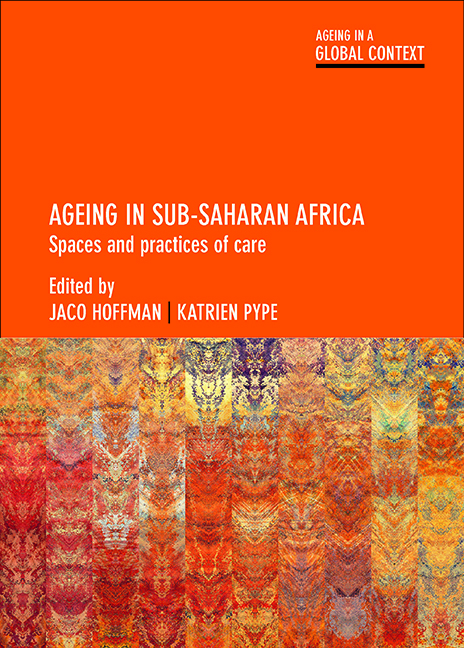Book contents
- Frontmatter
- Dedication
- Contents
- Lists of photos, figures and tables
- Notes on contributors
- Series preface
- Acknowledgements
- Introduction: Spaces and practices of care for older people in Sub-Saharan Africa
- one Will families in Ghana continue to care for older people? Logic and contradiction in policy
- two Caring for people ‘without’ value: movement, reciprocity and respect in Kinshasa’s retirement homes
- three Older people providing care for older people in Tanzania: against conventions – but accepted
- four Place matters: the home as a key site of old-age care in coastal Tanzania
- five Care and identity in rural Malawi
- six Making sense of neglect in northwest Tanzania
- seven Negotiating care for older people in South Africa: between the ideal and the pragmatics
- Afterword: Discourses of care for older people in Sub-Saharan Africa: towards conceptual development
- Index
six - Making sense of neglect in northwest Tanzania
Published online by Cambridge University Press: 05 April 2022
- Frontmatter
- Dedication
- Contents
- Lists of photos, figures and tables
- Notes on contributors
- Series preface
- Acknowledgements
- Introduction: Spaces and practices of care for older people in Sub-Saharan Africa
- one Will families in Ghana continue to care for older people? Logic and contradiction in policy
- two Caring for people ‘without’ value: movement, reciprocity and respect in Kinshasa’s retirement homes
- three Older people providing care for older people in Tanzania: against conventions – but accepted
- four Place matters: the home as a key site of old-age care in coastal Tanzania
- five Care and identity in rural Malawi
- six Making sense of neglect in northwest Tanzania
- seven Negotiating care for older people in South Africa: between the ideal and the pragmatics
- Afterword: Discourses of care for older people in Sub-Saharan Africa: towards conceptual development
- Index
Summary
Introduction
When you are old
And your back is bent
And you have no child
To whom will you belong?
Saida Karoli
These lyrics from a song by Saida Karoli, a popular Haya singer, convey the centrality of family and ‘belonging to someone’ in advanced old age, of having someone to rely on when physical strength is fading. As bodies age and change, older people's activities and abilities to engage in social relations change as well (Hastrup, 2005; Taylor, 2005). While physical decline is considered to be both normal and inevitable, older people's anticipation of the future makes changes to their physical strength a conscious concern.
In northwest Tanzania there are no formal care institutions, such as old-age homes, for older people. Former government employees receive a pension after retirement, but in rural villages these people are few, and mainly men. While solutions to the problem of old-age security are formulated by international advocacy organisations and local NGOs, at present the reality of old-age care in northwest Tanzania is that care for frail older people is mainly provided by the family. The ability of family members to provide this care has increasingly become insecure due to out-migration, adult death and economic deprivation.
At the same time, caring for dying children and orphaned grandchildren has played a large part in the lives of many older people, creating new challenges in intergenerational care relations. In this chapter the telling of stories about the neglect of people in their old age are analysed as observed during the course of a larger fieldwork project on experiences of ageing and care in the era of HIV/AIDS in a village in Kagera Region, northwest Tanzania. These stories illuminate older people's ideas about intergenerational care in the context of HIV/AIDS, and particularly their expectations for care in grandparent–adult grandchild relationships, which is here described as ‘new constellations of care’. Although the introduction of antiretroviral medicines at the end of 2004 marked the beginning of a new era, described by older people as ‘nafuu’ (relief), new long-term care demands also emerged. In households where members have multiple health concerns, long-term care involves constant negotiation over the distribution of scarce resources, including food, between household members, and often diverts attention away from the care needs of people in advanced old age.
- Type
- Chapter
- Information
- Ageing in Sub-Saharan AfricaSpaces and Practices of Care, pp. 137 - 158Publisher: Bristol University PressPrint publication year: 2016

